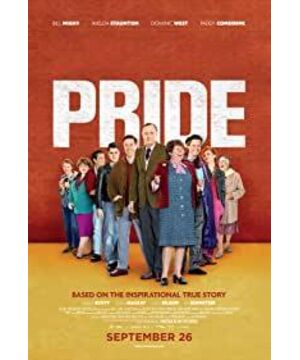The British film and television directors did not disappoint, adding all kinds of "black belly" jokes to their works. For example, whether it is the movie "Detective Sherlock" or the TV series "Sherlock", the relationship between Holmes and Watson has been dealt with very ambiguously. , All kinds of black-bellied small bridges have also made rotten girls all over the world hooked. This may also reflect the self-deprecating spirit and deep-rooted sense of humor in British culture.
However, homosexuality culture was not so easily and humorously displayed at the beginning. Until the second half of the 19th century, homosexuality was still regarded as criminal and immoral by the British. The persecution of the two geniuses of playwright Wilde and scientist Turing is still the most notorious case.
In the 1960s, with the "Wofington Report" as a starting point, Britain began to embark on the road of decriminalization of homosexuality. Of course, the so-called decriminalization only separates the law and morality, and no longer persecutes homosexuals through the law, but at the conceptual level, the British were far from accepting homosexuals at that time. It is as if the Americans passed the Affirmative Rights Act in the 1960s, but conceptual racial discrimination has not been completely eliminated until now.
Well, actually what I want to write is a film review. I recently watched a British film "Pride", which tells the story of the British gay movement in the 1980s. Explaining the background will help us understand the characteristics of that era. Although the theme of this movie is heavy, the plot is relatively easy to deal with, and it even has the meaning of singing and dancing.
The film is based on real historical events. Although it tells the story of homosexuals fighting for their rights, another major event occurred in the context of the times, which is the strike of British coal miners. The story tells the story of a small gay organization. In the conservative British society, its influence is extremely limited and fundraising is not ideal. So one day the organizers have a whim and plan to use the massive strike movement to increase their influence. They changed their fundraising slogan to homosexual support for strikers, and the effect was much better. They raised a lot of money.
Then came the problem. When they planned to donate the money to the union, the other party refused the donation because of their identity. At this time, homosexual organizations took a crucial step by bypassing the labor union and directly handing over the money to the workers in the strike area. The story unfolded like this.
In my opinion, the expression of the film is particularly good, first of all, it is the kind of relatively easy way to tell heavy historical topics. The film uses tears in laughter to arouse the emotional resonance of the audience. Through British humor and not-so-British singing and dancing, the people in the play maintain a dignified and optimistic image. I think this way of speaking is far better than that. The hardships of hardship and hatred are more stylish.
Another point is this kind of expression of seeing the big in the small. In the context of the big time, a short very dramatic clip is taken and described in detail, which makes both gay rights protection and miner strikes no longer a historical label. , But flesh-and-blood specific people and events, grand narratives, it is often easy for us to look at various historical events and figures rationally, while ignoring the specific people behind these events and figures. This will make people lose their pain and compassion.
From these two perspectives, the film is a success. It is easy for the audience to stand on the position of the director in this history. The workers' strike in the film ended in failure (because of the real history), and the sight of the workers returning to work adds to the atmosphere of sadness. If the audience is a bystander without a specific standpoint, this movie really has enough emotion and details to impress you. It’s a pity that I am not. I can’t abandon my hopeless rationality. At least in my opinion, if that period of history is tried, this movie can only be regarded as a word of one party, while the other side of the prosecution and defense is basically in the movie. Those who were absent were at most only a few facialized police images.
Alas, I was saying just now that grand history can easily make people lose their sensibility. Now I want to say it the other way around. Wayward artists and their clear-cut literary works can easily make people lose their rationality. This film expresses the clear leftist stance of the directors. What they hate is the ruling party at the time, the Conservative Party and their prime minister, Margaret Thatcher. I think if we want to understand the British of that era because of this movie, we should listen to the voice of the other party, such as watching "Iron Lady" starring Meryl Streep.
So I plan to explain another background. As early as after World War II, the British coal industry began to shrink. By the 1980s, under the impact of petroleum energy, the British economy's dependence on the coal industry had become weaker and weaker. The normal logic is of course a large number of layoffs. However, this industry is different. They have extremely strong union forces and have always held an uncompromising stance. Layoffs? Just kidding, not only cannot layoffs, the government also has to subsidize, and companies have to buy their products, so this redundant, low-efficiency, high-paying group has severely restricted the development of the British economy. The strike is their powerful weapon. Unfortunately, this time, they met the tougher Margaret Thatcher. The strike was suppressed by an iron fist, and the British trade unions also suffered a heavy blow. This hatred grew so strong that when Mrs. Thatcher died, she was cursed by the workers.
The reason for telling the historical background omitted by the film is actually the same. Don't ignore the specific people behind the historical events. When the workers fought for their interests, they harmed the interests of more British nationals. Their tax money is used to subsidize coal miners, they have to endure worse quality energy, and their economic development has been seriously delayed. Compared with organized labor unions, these citizens are in a disadvantaged situation. group. If an artist holding this position is allowed to make a movie, it will be completely different.
Of course, not all people in the film failed. At the end of the film, gay organizations won the support of the miners in turn. This conceptual understanding is more important than legal recognition. Then, step by step, Elton John and Ben Weishaw no longer have to conceal their sexual orientation. Britain has also become a "corrupt country" loved by people all over the world. This victory is undisputed.
View more about Pride reviews











